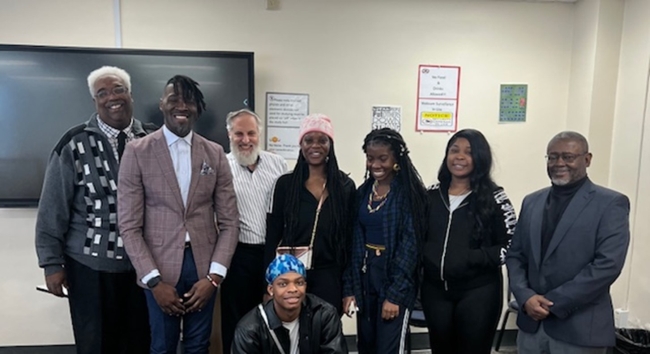You have /5 articles left.
Sign up for a free account or log in.

Students at South Carolina State University meet with University of South Carolina professors for a seminar on antisemitism.
Academic Engagement Network
Two historically Black universities are participating in a pilot program to train students to counter antisemitism. The effort announced last week is a partnership with the Academic Engagement Network, an organization that seeks to mobilize faculty members and higher ed administrators to “oppose the denigration of Jewish and Zionist identities.”
South Carolina State University and Voorhees University, a private HBCU (historically Black college and university) also in South Carolina, are hosting seminars for students on the history of Black-Jewish collaborations, Jewish identity and Israel and ways to confront antisemitism. The seminars delve into historic examples of solidarity efforts between Black and Jewish communities, such as Black newspapers’ coverage of the Holocaust, the involvement of Jewish activists in the NAACP (National Association for the Advancement of Colored People) and Black civil rights leaders’ support for Zionism.
The seminars, which started this semester, are being taught by two professors at the University of South Carolina, one Black and one Jewish, who previously partnered to teach courses about anti-Black racism and antisemitism at the predominantly white university: Meir Muller, rabbi and associate professor in the university’s College of Education, and Devin Randolph, clinical professor in the College of Education and assistant professor and founding director of environmental and social justice at Voorhees University. The Academic Engagement Network awarded the University of South Carolina a three-year grant, $25,000 each year, with plans to expand the program to at least five more HBCUs in the state.
Miriam Elman, executive director of Academic Engagement Network, noted that HBCUs have their own unique history of solidarity with Jewish people. Some of these institutions provided visas for and employed Jewish scholars who fled Nazi Germany.
She hopes HBCUs can “take a leadership role in condemning antisemitism and all its variants,” with students serving as “ambassadors” to “combat this within their own community.” The goal is to “to address antisemitism by finding allyship in other minority communities,” she said.
She believes previously strong Black-Jewish relations have been strained over Israel politics, with Black activist movements like Black Lives Matter disavowing Zionism and law enforcement trainings between the U.S. and Israel.
The program was already in development long before the current Israel-Gaza war, and its launch timing is unrelated to it, she added, but it comes at a time when concerns about campus climate for Jewish, Israeli, Muslim and Arab students have become “front-page news.”
“This is a good time to be doing this work,” she said.
Origin Story
Muller and Randolph, who are close friends, developed and taught a course together in 2020 called “Anne and Emmett: Confronting Antisemitism, Racism and Otherness through Pedagogy,” referring to Anne Frank and Emmett Till. Their current seminar series, which meets four times this semester at the participating HBCUs, grew out of that collaboration.
They noted that in rural South Carolina, there’s a small Jewish population, so students don’t necessarily know much about Jews or Jewish identity or see a lot of Black-Jewish friendships. The two professors believe their involvement in their respective communities and their personal relationship helps them get across their message of solidarity.
“Our connection is authentic, and I think the students sense that,” Randolph said.
Muller said HBCUs typically haven’t been campuses known for antisemitic incidents.
There is “this historic alliance between the Jewish community and the Black community, and I understand that alliance can be problematized, and the narrative is often too simple … but the communities worked together,” Muller said. “And I wondered how we could tap into that as a model to work together today.”
“I want us to tap into that richness of history to say, OK, what can we do today to have a pro-Jewish stance and counter antisemitism on your campus?” he added. “And perhaps some of those lessons can also be used to counter anti-Blackness in the larger society,” especially at a time when some state laws seek to limit diversity, equity and inclusion efforts in public education.
As part of the program, a few students selected on each campus will also receive extra training and serve as ambassadors for the program. Those students will work with the professors to help the HBCUs create policies regarding campus antisemitism and create antisemitism incident-response teams on their campuses.
Muller acknowledged that these institutions don’t have large Jewish communities, so if there’s antisemitism, it might not be toward a Jewish student.
“It could be a meme that’s shared, a joke that’s told, an image that’s used in a presentation …” he said. “We want students to be able to recognize how they can hold themselves up to the highest level, and their peers, even if there are no Jewish people.”
Saniyah Valcin, a first-year student at South Carolina State, said she’s enjoying learning details about Jewish religion and culture, such as what a “yarmulke” is or that Orthodox Jewish women traditionally cover their hair when they get married. Valcin, who comes from a Haitian-Dominican Catholic family, hopes students will get to visit a synagogue. And she has questions she wants answered, like how Jewish families go about explaining the Holocaust to their kids and how that compares with how her family talks about its history.
“I know that’s something very traumatic,” she said.
Lewis Gordon, Board of Trustees Distinguished Professor and Global Affairs and Philosophy department head at the University of Connecticut, noted European Jews in the U.S. weren’t always considered white by their neighbors, and there are also Black Jews, like himself. Black Americans and European Jews also historically formed relationships in communist and socialist circles before World War II, he said.
“There’s a long history of secular Jewish social justice organizations …” said Gordon, who previously founded and directed the Center for Afro-Jewish Studies at Temple University. “These were Jews committed to global social justice” who saw “the fight against racism, fascism” as a part of their Jewish identity.
The Current Moment
It isn’t lost on them that the program is launching at a time when students on campuses across the country are protesting the rising death toll in Gaza. HBCUs are no exception.
For example, a Spelman College student organized a rally in downtown Atlanta in support of Palestinians in late October. A group of students at North Carolina A&T State University also held a pro-Palestinian protest. Howard University’s chapter of Students for Justice in Palestine called on the university to ban companies “complicit in the crimes of Zionism” from career fairs in February. Some of these students draw parallels between the Palestinian cause and struggles faced by Black Americans in describing the drive behind their activism.
At the same time, some HBCU leaders have done outreach to Israeli higher ed institutions in recent years. The Thurgood Marshall College Fund, an organization representing public HBCUs, took leaders of six campuses on an inaugural trip to Israel in July 2022 and took a second cohort last summer.
“I think that the timing of this project is so important,” Randolph said.
The professors said they haven’t gotten any hard questions about the Israeli-Palestinian conflict yet—they’ve only taught one class so far—but they’re looking forward to being challenged on it.
“If we’re not cultivating learning opportunities in our classroom for our students to really be engaged then we’re not doing the good work. We’re not getting into the good trouble,” Randolph said. “I think we have to be willing to allow our students to pose those questions because I think that’s where we build the type of learning that we want to see in our classrooms and our communities.”
Valcin said it’s hard to know what questions to ask about the war because she doesn’t know much about the Israeli-Palestinian conflict. She’s hoping Muller and Randolph “sit us down and talk to us about it.”
Robin D.G. Kelley, Distinguished Professor and Gary B. Nash Endowed Chair in U.S. History at the University of California, Los Angeles who has written about Black-Palestinian solidarity and is on the board of Palestine Legal, an advocacy group, said in an email that antisemitism education at HBCUs seems like a “great idea,” but “an honest and critical curriculum is appropriate for college students, not propaganda,” which he worries could be embedded in such a program. He believes some of the common course materials used to teach about antisemitism, such as the Anti-Defamation League’s, conflate anti-Zionism and antisemitism.
“Any curriculum that does not address the ways in which antisemitism is weaponized as a shield against any and all criticisms of the Israeli state (as opposed to Jews—that is to say, criticizing Jews categorically in any form or fashion is by definition antisemitic, a point we all must understand) is not really worthy of a sophisticated curriculum,” he said.
Elman noted the program intends to confront the topic of Israel “head on” and “front and center.”
For example, she said the program will address how some anti-racism groups have barred Zionists from participating in recent years, excluding Jewish progressives with emotional ties to Israel, among other challenging topics.
“We don’t shy away from saying that there are antisemitic forms of anti-Israel expression, that we’re going to showcase the relationship between Jews and the connection to Israel. We’re not trying to hide or do a bait and switch,” she said.
The goal is to convey that “some of this rhetoric and some of this material lands very offensively towards Jewish students—here’s why” but also “here’s how to have pro-Palestinian activism that is not in any way offensive, and that’s what Jewish students want to join and be part of.”
She emphasized that the program doesn’t intend to “silence support for Palestinian rights, Palestinian nationalism, Palestinian justice” or negatively affect “student groups, student movements, who also want to criticize Israeli policy and Israeli state and societal practices, because that’s also perfectly acceptable in an academic setting.”
Gordon said it isn’t unusual for marginalized groups in the U.S. to try to build alliances with each other, which is what he believes is happening here. But he expects the program to get pushback.
“This is going to receive a lot of criticism from everybody who only sees blood if you say the word Zionism in any form,” he said, noting that there’s considerable ideological diversity on Israel among Jews broadly and among non-Zionist Jews. So there needs to be a “very truthful, critical and clear discussion of the history of what Zionism is.”
He noted that neither community was historically, or is currently, a monolith on the issue. He said Black Christians in the U.S. historically identified with the exodus story from the Old Testament, which inspired a sense of solidarity with Jews and a form of Zionism for some. Today, some influential and important Black activist movements, such as Black Lives Matter, are staunchly against Zionism, but he finds individual people in Black communities hold a variety of views. He rejects the idea that there’s a “broken down relationship” between Black and Jewish communities that needs fixing because he believes no one perspective represents either community.
The program raises “a very important conversation,” he said. He believes at a time of polarization, “it would be very good if there were contexts in which people can have really good critical, thoughtful, reasoned discussions and understandings.”





